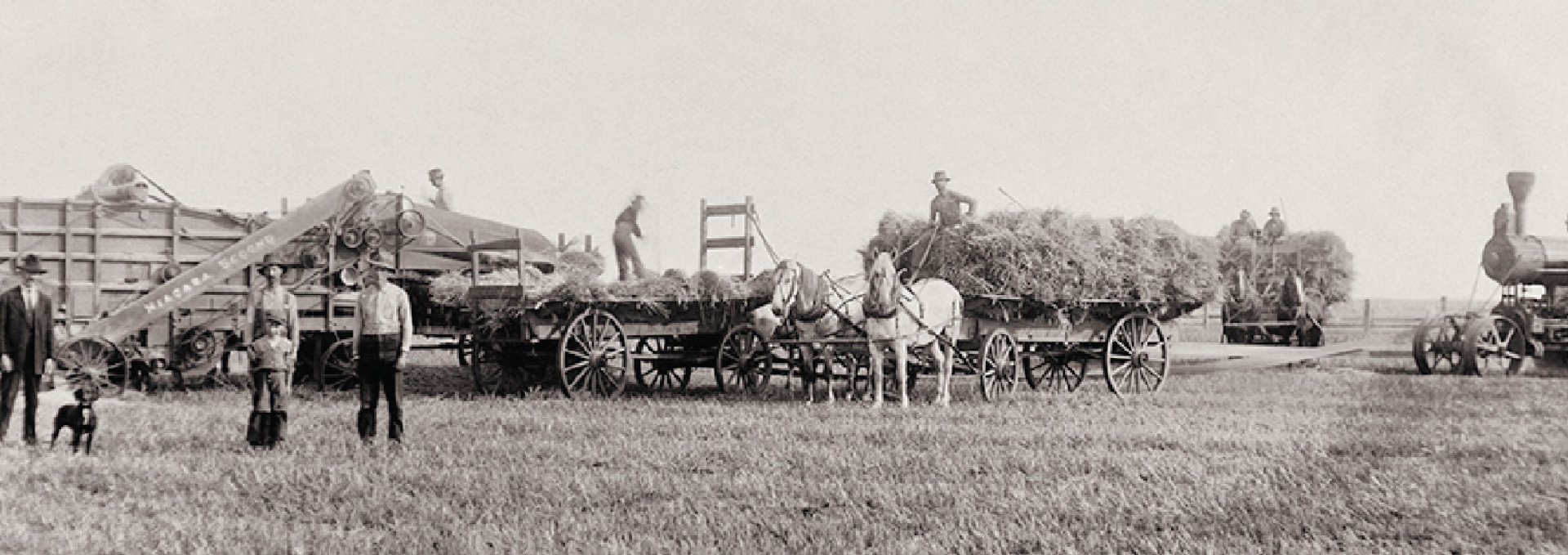Delta’s heritage encompasses archaeological artifacts, traditional Indigenous sites, natural features, and early fishing and farming communities. Learn more about the ways that Delta protects and conserves our heritage.
Heritage Planning
The following heritage "tools" may be used by Delta to protect heritage properties. Some tools are used to incentivize heritage protection and restoration projects. The incentives and level of heritage protection vary by the applicable tool and in some cases are negotiated on a site-by-site basis.
Heritage conservation areas are areas established in the Official Community Plan (OCP) for the purpose of preserving and enhancing heritage character. In heritage conservation areas, a heritage alteration permit is required prior to making changes to land or structures and proposals must meet guidelines in the OCP.
Delta has established the following heritage conservation areas:
- Ladner Heritage Conservation Area 1 - The area bounded by 48B Street, 48 Avenue, 47A Avenue and the drainage right-of-way. Many of the homes in this area were built between 1900 and 1924 and have an architectural style characteristic of that time period.
- Ladner Heritage Conservation Area 2 - The properties along Arthur Drive. Arthur Drive was constructed in the 1880’s and as many as 16 identified heritage buildings remain on this street.
Delta's conservation areas are identified on DeltaMap and the guidelines are in Appendix B of the OCP. If you have any questions, contact Community Planning (Development Department) at development@delta.ca or 604-946-3380.
Heritage designation is a legal protection tool for properties of particular value to a community. Heritage designation is typically reserved for properties that have outstanding merit and are highly representative of a community’s history and heritage. The protection is done through a bylaw that must be adopted by Council, and which sets out the property’s significance and any ongoing requirements that are needed to maintain the property to a specified standard. The bylaw may specify when a heritage alteration permit is required. Heritage designation bylaws are registered with the province.
A Statement of Significance is highly recommended for heritage designations. If you have any questions, contact Community Planning (Development Department) at development@delta.ca or 604-946-3380.
A Heritage Revitalization Agreement (HRA) is a legally binding agreement negotiated by the City and an owner of heritage property. HRAs are powerful and flexible tools specifically written to suit unique properties and situations. The terms of the agreement supercede land use regulations and may vary use, density, and siting regulations. The terms of the agreement describe the duties, obligations, and benefits for both parties and can require the owner to obtain a heritage alteration permit for certain works. A Public Hearing may be required if land use or density is affected by the HRA.
Generally, the owner of a heritage property agrees to restore, preserve, and protect the building and/or specified heritage features. In exchange, the City will vary use, density, and siting regulations. The variances are an incentive to both restore and protect the heritage building and allows the owner more freedom to adapt or modernize the property.
See what information is needed in a Heritage Conservation Plan. A Statement of Significance is also highly recommended for heritage revitalization agreements. If you have any questions, contact Community Planning (Development Department) at development@delta.ca or 604-946-3380.
Under the Local Government Act, Council may approve a temporary protection order for up to 60 days if it considers that heritage property might be adversely affected by a development application. Temporary protection measures are only permitted to be enacted for designated properties, properties on the Heritage Register, Urban and Rural Inventories, or within in heritage conservation areas. For those 60 days, Council can withhold issuance of a demolition, building, or development approval to provide time to collect information on a property including a detailed inspection of the heritage features of the property. This period also provides the opportunity to discuss any options for long-term protection with the property owner. Based on the information collected, City staff may write a report to Council outlining conservation options for their consideration before the temporary protection period expires.
Alternatively, Council could also introduce a temporary protection control period of a year for the purposes of heritage area planning. A temporary protection control period must be enacted by a bylaw. The bylaw may identify specific landscape features, specify the types of alterations which are permitted without a heritage alteration permit, and/or establish policies regarding the issuance of a heritage alteration permit in relation to property in the protected area.
A community heritage register officially lists properties that the local government identifies as having heritage value or character. Listing on the Heritage Register offers the possibility of exemptions and equivalencies under enabling legislation, in exchange for temporary delays in approving building permits and demolition permits.
Delta's Heritage Register was established in 1999. It has been Delta's practice that owners of sites on Delta's Heritage Inventories are invited to place their properties on the Register; however, there is no obligation. However, property owners may be required to place their property on the Register in order to qualify for incentives as part of heritage-related agreements. Properties on Delta's Heritage Register are flagged so that the review process for any type of application regarding them will consider their heritage status. Properties on the Register are eligible for reduced Building Code requirements and for nomination to the National Heritage Register.
A Statement of Significance is required for properties to be placed on a community heritage register. The properties on Delta's Heritage Register are identified on DeltaMap. If you have any questions, contact Community Planning (Development Department) at development@delta.ca or 604-946-3380.
A heritage alteration permit (HAP) is an approval that is required to proceed with the desired changes to a protected heritage property (i.e., through a heritage covenant, heritage revitalization agreement, municipal designation bylaw, heritage conservation area bylaw, or a temporary protection order or bylaw). The heritage protection mechanism includes guidelines for construction and alteration restrictions that aim to protect the integrity of the overall area and the heritage values of individual properties.
There is no charge for a HAP. Council approval may be required, or in the case of a "minor" HAP, approval may be granted by the General Manager of Development. A HAP cannot vary land use or density provisions in municipal bylaws.
In order to determine if a HAP is required, the heritage covenant, heritage revitalization agreement, designation bylaw, heritage conservation area guidelines, or a temporary protection order or bylaw must be reviewed. If you have questions, contact Community Planning (Development Department) at development@delta.ca or 604-946-3380. See the How to Apply page for application forms and requirements.
The Land Titles Act enables local governments to register covenants on title for heritage protection. A heritage conservation covenant is a contractual agreement between property owner and the City and may outline the responsibilities of the owner with respect to the conservation of a heritage property. The covenant may contain regulations and conditions that require the owner to obtain a heritage alteration permit. A covenant cannot vary any provisions in municipal bylaws, including land use or density. As covenants are registered on the property title, it is binding on future property owners and therefore ensures long lasting protection.
Title searches and land title documents must be requested from the Land Title and Survey Authority of British Columbia. For copies of title searches and charges registered on title, please contact a notary or lawyer or visit myLTSA. You may wish to seek legal advice to understand the implications of the charges on the title of your property.
In 2017, Delta established a fund to support heritage conservation and encourage the retention and maintenance of heritage properties in Delta’s urban and rural areas, as a key recommendation of Delta's Heritage Strategy. Through Delta’s Heritage Conservation Grant Program, owners of heritage buildings in Delta may apply for up to a maximum of $50,000 (50% cost-sharing) from the Heritage Conservation Grant Fund for repairs and restorations that would preserve and protect their heritage building. If the grant funding is provided for accessibility upgrades, the maximum annual assistance may be increased to 100% coverage of the capital costs up to a maximum of $150,000. Please visit Delta's Heritage Grants webpage for program highlights and eligibility requirements.
Heritage Properties
Delta encourages our community to discover, promote, and protect our heritage. Delta and the Heritage Advisory Commission have created a number of self-guided tours and invite you to explore your neighbourhood's fascinating history:
- Delta Heritage Passport - Volume 1: Delta's historic sites marked with a plaque or interpretive sign.
- Delta Heritage Passport - Volume 2: Annieville and Sunbury communities in North Delta.
- Delta's Rural Heritage Driving Tour: a driving tour featuring a selection of Delta's historically significant rural buildings and sites.
Delta recognizes its heritage resources through an inventory, register, and finally, by heritage designation. Find more information below.
Delta has two inventories of its heritage resources, one of rural heritage and one of urban heritage. Properties included in the inventories have been evaluated by Delta’s heritage consultant as having heritage significance based on architectural history, cultural history, context, and integrity. About 190 heritage sites are identified in the inventories. Implications of properties being on the Inventories:
- No additional regulations are placed on a property.
- Properties qualify for heritage incentives that Council may approve.
- Properties are “flagged” on Delta’s information database. If any zoning, or building, or demolition permit applications are made, staff will contact the applicants to discuss the possible incentives to preserve the heritage features.
- In the case of demolition permit applications, if an agreement cannot be reached to preserve a heritage building, applicants are requested to offer the building for sale for $1.00 to whoever is prepared to remove it. Applicants are then asked to contribute to the removal, funding which would have otherwise been spent on demolition.
Properties on Delta's heritage inventory are identified on DeltaMap. If you have questions, contact Community Planning (Development Department) at development@delta.ca or 604-946-3380.
The Delta Heritage Register was established by Council on March 9, 1999. It is the official register of sites of heritage significance in Delta. Properties on the Delta Heritage Register are flagged so that the review process for any type of application regarding them will include discussion of incentives for their preservation and maintenance.
Designated Heritage Properties are significant heritage properties which are protected by bylaw to ensure long-term preservation and maintenance. Any changes to designated heritage properties must meet requirements set out in the protection bylaw and require Council approval.
Canada's National Heritage Register was established in 1999 as part of the Historic Places Initiative with the objectives of increasing knowledge and appreciation of Canada's heritage and working towards its preservation. Delta has been participating in the initiative since 2004. More than 50 Delta properties have been nominated to the National Heritage Register to date. The National Heritage Register can be viewed at Canada's Historic Places website.

